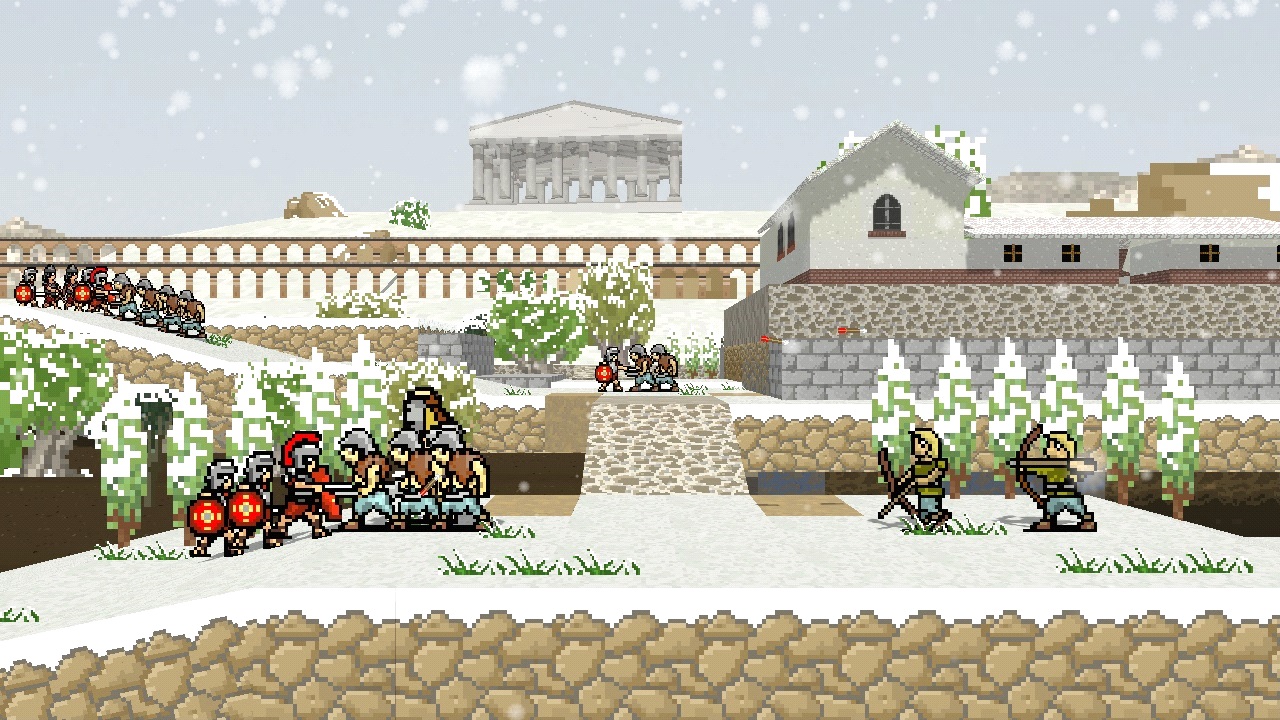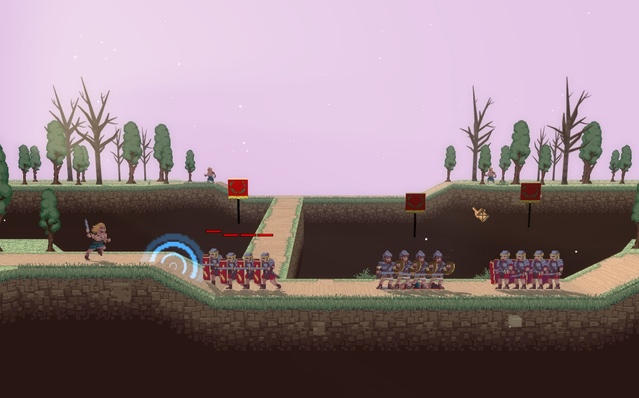World War II isn’t the only historical period that gets to have fun on Kickstarter. There are plenty (read: a few) games that found success by breaking away from the mold. There are games about the American Civil War, Medieval Europe, and… well, that’s it actually. Except for one other game – Super Roman Conquest, set during reign of the Roman Empire.
All has not been well in Super Rome, as developer SeaCliff Interactive has become notorious for their lack of updates. A scant 110 word update in March 2017 – little more than the developers wishing they could have an early build ready – is the only indication that development is still ongoing. Before that, there were a grand total of two updates in 2016 – one apologizing for the lack of updates, and the other promising an Early Access build that never materialized.
Contrast this with the near monthly updates from the campaign’s success in November 2016 to March 2016 when they became a lot less frequent, and its clear something is going on behind the scenes. Or indeed, nothing.
 Super Roman Conquest got funding for its unique premise. It’s a strategy game in full 3D, but played from a 2D perspective. Think something along the lines of FTL: Faster than Light or Darkest Dungeon. You have control over individual units, or you can group together a whole squad and given them orders together.
Super Roman Conquest got funding for its unique premise. It’s a strategy game in full 3D, but played from a 2D perspective. Think something along the lines of FTL: Faster than Light or Darkest Dungeon. You have control over individual units, or you can group together a whole squad and given them orders together.
Missed Opportunities
You could say the game is one big missed opportunity. Funded in October 2013, even the promised Early Access version is nowhere in sight, let alone a finished game. This wouldn’t be quite such a problem if it weren’t for the total lack of updates. Backers have had only three updates since January 2016, and the latest is so devoid of content it’s practically useless. It follows the same template as other updates – apologizing for the silence, saying progress is going well, promising an early build for backers soon but not being able to say when, and a final, limp thank you.
“Hey again folks! Apologies for the lack of updates. Development marches on at a staccato pace here on SRC. Good news is we addressed some fundamental issues with our engine that fixed up a couple beleaguered systems.
“I wish today we could present an early build to you guys. We’re close, but hit some last minute showstopper bugs that require a couple more work sessions. We don’t get to work on it as much as we’d like, but we assure you a build is on the horizon.”
 A previous update at the end of December 2016 sheds some light on the delay, but not the silence.
A previous update at the end of December 2016 sheds some light on the delay, but not the silence.
“As we mentioned in an earlier update, Tim and myself have been working day jobs to ensure that the money you pledged is used solely in the development of the game. Unfortunately in the last year these jobs, mixed with some large life changes, has taken up much more time than we anticipated. This delicate balance of life and work has crept into time that was previously used to work on SRC which has affected how much we’re able to get done.”
The More Things Stay the Same, the More They Still Stay the Same
We ran a story before this update came, about the lack of communication from SeaCliff. Not long after, Matt Boland of SeaCliff contacted us to reiterate the game was not canceled and that everything was fine. The quote reads like many of these updates, a generic “sorry for being silent, we’re still working, everything’s fine,” and nothing more. But one sentence stood out.
“We will continue to strive to be more open in our communications going forward, starting with Kickstarter update in the next week or so.”
Sure enough, they released an update a week or so later. However, they failed in their promise to be more communicative with their backers. In the months following, the March update is the only indication backers have received that the game isn’t dead. The game’s Twitter has been dead since September 2015, and it’s Facebook since January 2015. We reached out to SeaCliff before publishing this story, and haven’t received a reply.
How can you not blame backers for assuming the game is dead when you’re only occasionally telling them it’s not, without having anything to show?
Denarii Don’t Grow on Trees
SeaCliff Interactive raised $41,909 for Super Roman Conquest, a pittance compared to how much most games cost. For a studio comprised of former LucasArts developers, that might as well be pocket change. It’s hard to imagine much of that cash still remains in their coffers almost four years on, even with studio employees taking on day jobs.
Even with the day jobs and whatever funding issues may be present, that doesn’t excuse the lack of updates. Three updates in 17 months is inexcusable, especially when the game is three years late. Backers haven’t seen any new footage of the game in years. They haven’t even seen new screenshots since a January 2016 update provided just three. It would take five minutes a month to write a simple update explaining what’s going on.
What Are the Backers Saying?
It’s not hard to understand why so many backers are so pessimistic. The comment section reads like a misery pit where hopes and dreams go to die. “It’s too bad. This game looked really good…,” says Anthony Hamm.
“Seriously guys?! It’s almost been three years, and you haven’t provided updates in months,” writes Matthew Jones. “Just glad I only spent $10 on this.”
Backer illplazo is probably the most pessimistic of them all. “Seacliff, I think enough is enough no? Just admit this is never going to be made. It’s only 10 dollars, so not a huge deal either way, but this just reinforces why no one should ever back any videogame, way too much vaporware and dead projects out there. I only back tabletop projects now.”
This is why it’s so important crowdfunded developers keep providing frequent updates. Crowdfunding campaign don’t exist in a vacuum, what one developer does (or doesn’t do) affects everyone. It’s like Steam Greenlight – one bad game might not ruin the service, but the torrential sea of garbage it became crippled it. That meant some truly great games never got a chance because so many people swore off it. Steam is replacing Greenlight with Direct later this year, but Kickstarter can’t exactly replace itself, can it?
 I hope for Kickstarter’s sake that SeaCliff can pull it together. Release the game soon, or just provide more updates, whichever. From a historical standpoint, Super Roman Conquest is important. It might not be the most historically driven game out there, but it’s success on Kickstarter serves as an example. Other history-minded developers need to take a close look at the good and bad.
I hope for Kickstarter’s sake that SeaCliff can pull it together. Release the game soon, or just provide more updates, whichever. From a historical standpoint, Super Roman Conquest is important. It might not be the most historically driven game out there, but it’s success on Kickstarter serves as an example. Other history-minded developers need to take a close look at the good and bad.
Take the unique gameplay elements and a fantastic Kickstarter pitch, and provide constant, meaningful updates in a timely manner. Super Roman Conquest could end up being a Kickstarter success story, or another in a line of failures. Either way, it’s value is already apparent.
Cliqist is partnering with Games of History to provide a series of articles looking at history-based video games on Kickstarter. Games of History is a YouTube channel run by Cliqist Executive Editor Josh Griffiths. It examines the accuracy of history-based video games through a variety of shows.





